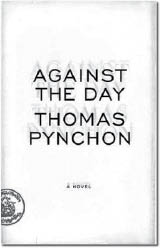Against the Day, by Thomas Pynchon
by Todd Natti

Thomas Pynchon’s new novel, Against the Day, is a big book, clocking in at 1,085 pages. Perhaps a better word to describe it would be “difficult.” It’s a word that seems to work both for Pynchon (I challenge anyone not to call “difficult” a man who sends comedian Irwin Corey to accept the National Book Award on his behalf) and even better for his novels, which recently prompted Time magazine to state: “Ordinary novelists have readers. Thomas Pynchon has decoders.”
That’s an understatement, especially when it comes to Against the Day. Sprawling over the years between the 1893 Chicago World’s Fair and those directly following World War I, Pynchon lets his novel traverse not only time but continents, topics and characters. He’s been doing so his entire career and is quite adept at this. It is pointless to try to describe the plot. What you do find are the Chums of Chance, a group of bickering aeronauts who are the subject of numerous dime-store novels, the titles of which sporadically sprinkled in. They open and close the book and pop in every now and then when needed. There is also an anarchist bomber, Webb Traverse, and his four offspring, who provide many of the novel’s subsequent storylines.
There is also a bevy of characters—the author once again brings more than one hundred different people into the story—whose names will make your teeth grate. Pynchon says “Let the reader beware” in the press release and I will echo his sentiment: There will be times when you want to reach through some gateway in the fourth dimension (which also appears in the book) and strangle the author, screaming, “We know this is fiction, stop giving your characters such ridiculous names.”
Let’s return to difficult. Is Against the Day difficult? Yes. Is that because it is difficult writing? Not necessarily. Pynchon’s language never approaches the bloated pretentiousness that his former contemporary, John Barth, is all too good at. Pynchon aims and succeeds at capturing the language of the times. His heroes are the common man and his writing reflects that. What makes Against the Day a difficult book and likely a turn-off for general readers is the sheer amount of information and characters that it contains. Quantity does not necessarily equal complexity or worthiness of being read. This is not to suggest that Pynchon is a poor writer; on the contrary, in almost half a century of writing he has not lost a step. Against the Day just feels like it should have been more, only not lengthwise.
No doubt at this very moment the author’s fans are reading Against the Day for the first time of many, tracing its links to history and his previous novels, both literally and theoretically. Maybe that is Pynchon’s true genius. By remaining reclusive and writing these massive novels every 10 years or so, he generates press not about the book itself but about the fact that it is a Pynchon book. Will there be essays piled high written about Against the Day? Yes. Will casual readers pick up Carl Hiaasen’s new novel, Nature Girl, instead? You bet. And all the while will Thomas Pynchon be laughing all the way to the bank? How could he not?
|
Issue Navigation> Issue Index > v6n3: No Deal on the Buffalo Casino (1/18/07) > Book Reviews > Against the Day, by Thomas Pynchon This Week's Issue • Artvoice Daily • Artvoice TV • Events Calendar • Classifieds |









 Current Issue
Current Issue